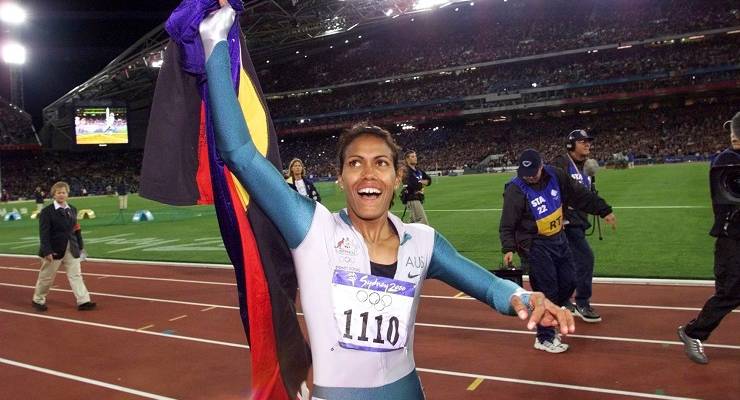
It’s hard to believe it was 20 years ago next week that Sydney opened its arms to embrace the world at the Sydney Olympics. Today there’s no embracing. No crowds. No foreigners even allowed in.
This contrast can’t entirely be blamed on the pandemic; the global love-fest ended long before this. In fact, it ended within one year of the great party.
The Sydney 2000 party had kicked off months earlier at the beginning of the new millennium, as the city got ready for the spotlight. Sports stadiums went up, highways were laid down and the newly refurbished Woolloomooloo wharf restaurant precinct was jumping. Business geared up for a prolonged tourism bonanza, despite the fact that the unpopular GST had just been implemented in June.
Sure, there were the usual Sydney-style scandals. There was a ticketing rort — who would have thought the elites were getting favoured treatment in the allocation? — and the ongoing drip of bribery and corruption stories going back to how Australia actually won the bid.
Australian Olympic Committee president John Coates survived the outcry — indeed, he’s still clinging on 20 years later — but another International Olympic Committee (IOC) official, Phil Coles, did not. Coles was forced to stand down over bribery allegations (which he has consistently denied).
The Olympic Village Mayor, Graham Richardson, (yes he’s still around today too) was also on the defensive over the various scandals, but Australia won plaudits for being the first nation to provide free accommodation to all athletes.
And there were plenty of them. A total of 11,000 athletes and officials from 199 countries and another 100,000 international visitors descended on Sydney for what we proudly declared was “the best games ever”.
For two glorious weeks the scandals and scepticism were forgotten. Indeed, from the moment the horses thundered onto the huge new Olympic stadium at Homebush and Cathy Freeman lit the cauldron, it was 16 days of celebration.
The equivalent of the entire population of Sydney, some 4.5 million people, crammed through the turnstiles after arriving on packed trains. They were greeted by the army of 47,000 volunteers sporting Akubra hats, huge smiles and a friendliness that stunned visitors and even many Australians.
There were the sporting highlights of course but the enduring memory for Sydney and overseas guests was the warmth of the welcome which went on day and night. Even the unpopular Darling Harbour precinct was heaving through the night as everyone tried to befriend athletes and gain access to the parties sprinkled everywhere.
A giant screen at Circular Quay allowed crowds to sit on the street and watch Roy and HG take the piss out of the IOC with Fatso the Wombat, the unofficial mascot who was at one stage banned from the podium.
Even cynical sports journalists were declaring the games should just stay permanently in Australia. One claimed “if you’ve found Cindy Crawford, why would you date anyone else?” It was a very noughties spin.
For this brief shining moment Sydney felt like a giant global metropolis, like the real 24-hour cities of New York and London. It couldn’t last, of course.
The New York Times reported a few years later on the Sydney Olympics hangover. They quoted one Australian saying, “it was a hell of a good party for two-and-a-half weeks … then it all went, and for a year or two there was a mourning for the games. We were the centre of the world. We were on the world stage. Now it’s gone and what do we do now?”
Indeed what did we do with it? Columns have been filled on the squandered tourism opportunities. The numbers never added up. In 2001 a report forecast 7.5 million visitors by 2010, but it barely topped 5 million until years later and then it was propelled only by the Chinese influx.
The problem was that our warm, welcoming reputation took a fatal hit less than a year later. A Norwegian ship called Tampa was refused entry to Australia after it rescued hundreds of asylum seekers at sea.
“We will decide who comes to this country and the circumstances in which they come,” declared prime minister John Howard during the 2001 election campaign. The Olympic goodwill had totally evaporated.
The Tampa incident took place in August 2001, and then came September 11. It was a few days before the first anniversary of the Sydney Olympic opening ceremony: planes hijacked by terrorists brought down the Twin Towers in Manhattan and the world changed forever.
Unprecedented was a word used then to describe New York being closed down for a week. Planes being grounded across the United States for days.
Unprecedented until now. If the world changed much in that year after the Sydney Olympics, it is unrecognisable now.
Whenever the Olympics are finally held again, the only certainty is they won’t be anything like “the best ever games” of Sydney.








Bit of a shoehorn here. The fact is, the Olympics have been a disaster for any city for a while – that’s why no country wants them any more.
Tampa might have cruelled our international reputation but it did wonders for the Rodent and his repellent spawn.
Trump is not an aberration,he is the epitome of the USA as the Rodent was the apotheosis of middle Straya and the bathos of Morriscum was the inevitable end of that trail of tears.
I remember watching my mate at the Paralympic Archery and that little prick J W Howard turned up so we all got booted for his flunkies. I also rememebr that that same little mongrel with his racism brought it all down in tears.
Olympics are a poisoned chalice pursued at high cost by less developed nations or cities; in some parts of the world blink and miss them (not all nations are obsessed like Oz for big events).
More telling a little later, for Australia’s image in the view of many observers, was Tampa and the then Australian government helping to change the nation’s brand from ‘cool’ to insular and xenophobic (in appealing to ageing electorates).
WW bet me to it. While in the USA and the UK over 2018 I met a few people (by chance) who conveyed (in a sentence) that the cost of hosting games (just the security and insurance stuff alone) is prohibitive compared with the foretasted tourist benefit. A number of cities in the USA and the UK (and I suspect elsewhere) have been approached and the answer has been “na”
As to the Oympics, I think the boomers will see the multi-natioonals hosting the games if they can see a dollar in it. Nationalism : OUT. NeoLib and Globalisation : IN
Lastly (interesting to observe the flack that Schawb receives just for presenting an alternative view when YOU seek to compare a 400m race with an item of national policy. Do you agree or disagree with the statement made by Howard? Not that it matters but MOST of the country agrees NOWADAYS. If you disagree then explain yourself AND compare the relevance to (e.g.) a high-jump event.
If you intend to impress the readership with your command of history jot an impartial note regarding the fate of the passengers of St. Louis mid 1939; i.e. PRIOR to the declaration of war by Chamberlain AND compare that to the Tampa.
Lastly, do you actually enjoy perverting events in history; is it just a
harmless game?